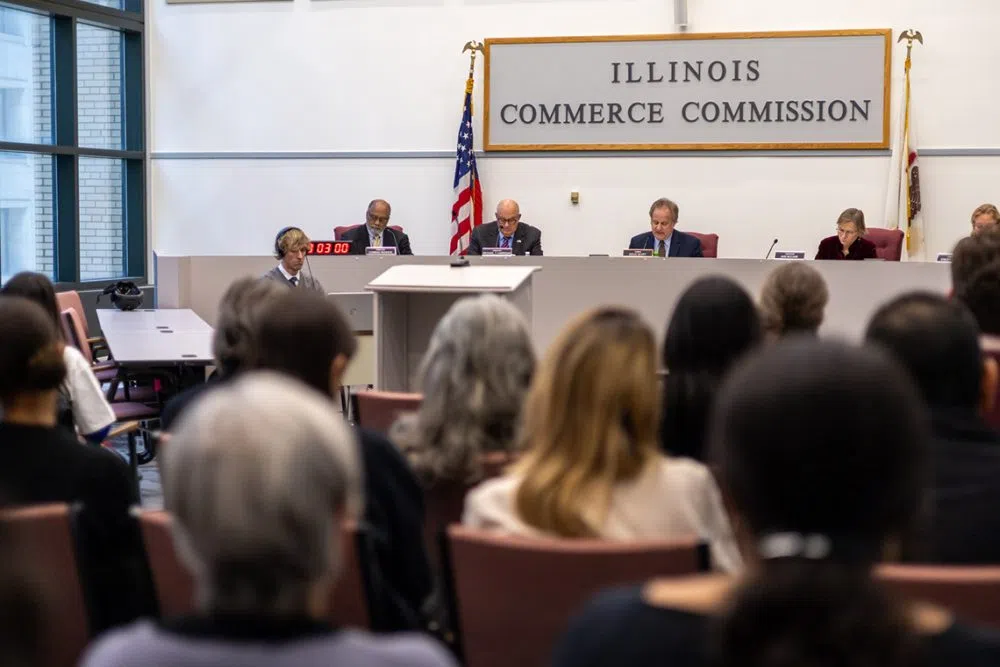Illinois utilities are set to invest more than a billion dollars into upgrading the state’s electric distribution grid, resulting in higher rates for customers around the state.
The Illinois Commerce Commission on Thursday approved scaled-back plans submitted by Commonwealth Edison and Ameren Illinois, the electric utilities for northern and southern Illinois, respectively.
The plans outline the next three years of infrastructure upgrades, laying out how the companies will roll out new technologies to meet the state’s clean energy goals and maintain existing infrastructure.
Regulators approved $1.5 billion in spending for ComEd, a 25% reduction from their original plan. They also approved $333 million in spending at Ameren, a 75% reduction. Ameren also had some additional spending approved earlier this year due to a procedural appeal of a previous ICC decision.
The ComEd plan includes an average increase in residential bills of about $22 per year each year between 2024 and 2027, when the company is expected to file a new grid plan.
Ameren has not released a final cost estimate for its 1.2 million customers, but officials at the company say Thursday’s decision will increase bills by less than a dollar per month.
Read more: After being rebuffed by regulators, utilities file slimmed-down spending plans
These increases are on top of those approved in 2023 as part of separate multi-year “rate plans.” Both the grid plans and new ratemaking process are part of the 2021 Climate and Equitable Jobs Act, landmark climate legislation that set Illinois’ goal of decarbonizing the electric grid by 2045.
But the companies initially struggled to meet that act’s requirements. ComEd and Ameren filed grid plans in early 2023 with the goal of having them approved at the end of that year.
But in a rare and surprising move, commissioners at the ICC rejected those plans on a split vote. At the time, they said the companies didn’t meet legal requirements to prove that their plans were “cost effective” for customers and directed the two utilities to refile updated versions.
Read more: State regulators once again flex muscle in rejecting utilities’ grid plans, lessening rate hikes
Over the past nine months, regulators, state officials, consumer advocates and environmental groups have litigated and debated the revised plans, and the commission approved modified versions Thursday.
Representatives of both companies said they’re still reviewing the decisions but indicated they were happy to have more certainty for the next few years of infrastructure spending.
“Our primary focus remains our commitment to providing safe, reliable, affordable and sustainable energy to our customers and communities,” ComEd spokesperson John Schoen said in a statement.
Ameren officials said their plans to install upgrades and replace aging infrastructure will be good for customers in the long run, even if it comes with upfront costs.
“It is a ‘pay now or pay more later’ proposition,” Matt Tomc, who manages Ameren’s regulatory policy, told Capitol News Illinois.
The upgrades laid out in the two plans are notable because many of them are aimed at making electric distribution easier as the state moves toward relying on more renewable energy sources. This includes new methods of managing distributed energy generation – like rooftop and community solar projects.
The plans also include more traditional spending on “poles and wires” – the distribution infrastructure that brings electricity to homes and businesses. Tomc noted this maintenance work has also changed due to an increased focus on the grid’s “resilience” in the face of severe weather events around the state.
Some state officials are beginning to worry about the long-term prospects for Illinois’ clean energy goals – particularly the future for clean energy generation and long-range transmission. But these grid plans, which focus on the local distribution network, were hailed by several advocates and regulators as a win for the state’s clean energy policy.
Read more: Worried about grid reliability, state officials seek to boost renewables, energy storage
The regulatory cases, which function like court proceedings, had several groups submit testimony and arguments that ICC commissioners weighed in their final decision. These groups included consumer advocates, environmental groups, the state and businesses that have an interest in energy policy.
Brad Klein, managing attorney at the Environmental Law & Policy Center, worked on the case and told Capitol News Illinois he was pleased with the collaborative approach that the state is taking to meet its climate goals and improve the electric grid.
“We hope this becomes a model for other states,” Klein said.
As part of this process, ComEd signed a memorandum of understanding with ELPC and several other groups to share data and work with them on future grid planning projects. Klein noted that while Ameren doesn’t have that formal obligation, it made similar commitments to ComEd.
Consumer advocates at the Citizens Utility Board, which also took part in the case, acknowledged that the decisions were a “step in the right direction” to limit what they called “wasteful” utility spending.
“In the face of foot-dragging by Illinois’ biggest electric utilities, this ICC has shown concern for affordability and reducing reckless utility spending,” CUB spokesperson Jim Chilsen said in a statement. “Of course, an increase of any kind will be difficult to bear for far too many customers who have been hit with multiple utility rate hikes over the last decade. We still have a lot of work to do to secure a clean, affordable energy future for Illinois consumers.”
ICC Chair Doug Scott called the decisions a “first step” and said future plans will be “refined and improved.”
Other commissioners noted that they expect continued collaboration between the utilities and others involved in the process.
“The work is not done,” ICC Commissioner Conrad Reddick said. “Today’s orders ask more of all the stakeholders. … CEJA mandates stakeholder workshops with wide participation, informed debate and robust discussion as the engine of that work.”
(Reporting by: ANDREW ADAMS, Capitol News Illinois)
Capitol News Illinois is a nonprofit, nonpartisan news service that distributes state government coverage to hundreds of news outlets statewide. It is funded primarily by the Illinois Press Foundation and the Robert R. McCormick Foundation.







Comments